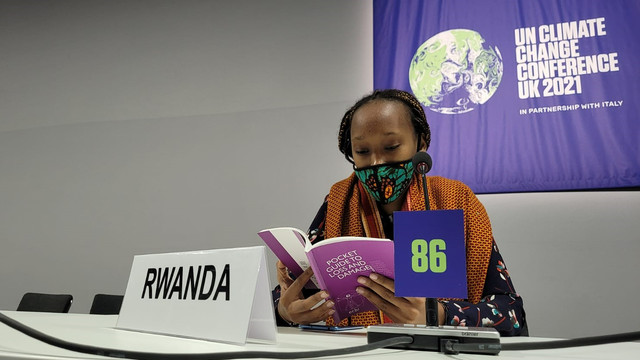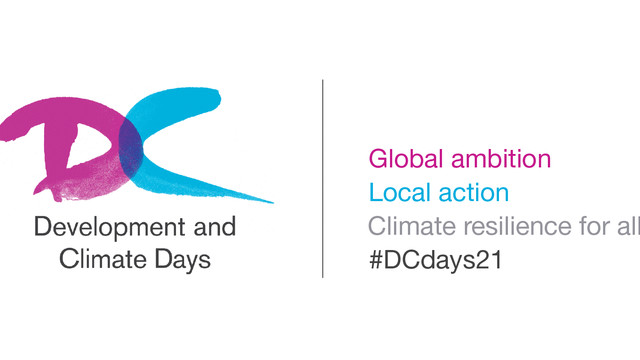Bringing youth’s energy from the streets to the climate negotiating table
Guest blogger Yared Abera shares how he navigated the steep learning curve to becoming a climate negotiator and the valuable guidance he received along the way.


Yared Abera acted as a climate negotiator for Ethiopia at COP26, focusing on the issue of loss and damage (Photo: Elaine Harty/IIED, CC BY-NC-ND 4.0)
- Read Eva Peace Mukayiranga's challenges and highlights from the negotiating rooms at COP26
Last year at the UN climate change conference (COP26) I transitioned from being a youth delegate for my country of Ethiopia, to being a climate negotiator. And with the support from the government’s Environment, Forest and Climate Change Commission I was tasked with negotiating the issue of loss and damage.
During my student days, I actively engaged in various extra-curricular activities such as the Ethiopian Model United Nations – a simulation of the UN where students take on the role of delegates from different countries, attempting to solve real world issues using the policies and perspectives of their assigned country.
I also joined the student initiative Youth Negotiation on Climate Change Convention that sought to generate a cohort of young climate negotiators. As I learned more about the devastation climate change causes my country, I began advocating for action. I attended three COPs as an official youth delegate, joining youth-related sessions and assisting the national delegation.
At COP26, having ‘graduated’ to becoming a climate negotiator, I aligned myself with the Least Developed Countries Group, the African Group of Negotiators and the G77.
My first goal was simple: to build up my substantive knowledge of the negotiations, to understand how the UNFCCC processes and procedures actually work.
How do the negotiations work?
At past COPs I observed the negotiations from a distance. Now as an actual negotiator and in the thick of it, I was in for a shock. Participating as a climate negotiator is not only incredibly intense but understanding and following the UNFCCC process is itself very demanding.
To get to grips with how the negotiations work, I made good use of the resources and expertise around me. I drew on relationships I had built with negotiators and coordinators during previous COPs to build up my knowledge.
I was lucky to be assigned Raju Pandit Chhetri as my mentor, an experienced climate negotiator from Nepal. Raju shared with me his vast knowledge on the workings of the UNFCCC along with practical guidance such as how to keep track of my thematic topic, how to stay on top of the latest relevant developments in the negotiations and how to interject effectively during negotiating sessions.

Abera believes there was progress at COP26, albeit slow progress (Photo taken from UN Climate Change video)
I followed Raju’s advice and used the preparatory meetings as opportunities for establishing good relationships with coordinators and other negotiators. I also took on board Raju’s tips for how to approach the various meetings and negotiating sessions: listen, ask, read; listen, ask and read some more.
The sheer volume of reading material attached to one topic was incredible. Before COP26, I had intended to follow another topic on top of loss and damage; the reality of this proved extremely difficult.
Following loss and damage
My interest in loss and damage comes from the deep and largely irreparable climate impacts that Ethiopia has experienced. In 2015-16 El Niño caused drought across large parts of eastern, southern, and central Ethiopia. It left over 10 million people in need of immediate food assistance and emergency relief; 6 million children were at risk from hunger, disease and lack of water.
Loss and damage from climate change needs much more attention in international climate policy. Witnessing the devastation across my country combined with the imperative to get governments to recognise the realities of loss and damage drove me to follow this topic.
I was so glad that young negotiators made contributions in our LDC Group prep meeting to strengthen our positions at #COP26. The increased involvement of young negotiators in our group is something I have wished for since the beginning of my chairmanship so very pleased to see it pic.twitter.com/1cfNoJGNdh
— LDC Chair (@LDCChairUNFCCC) October 26, 2021
Some wins, some losses – some progress
From a developing country perspective, we were pushing for three areas of agreement on loss and damage. And how did it go? First, there was agreement on defining the functions of the Santiago Network − a body tasked with building technical expertise to deal with loss and damage.
On the second area, of agreeing governance of the Warsaw International Mechanism for Loss and Damage, we made no progress at all. Thirdly, on finance for loss and damage we proposed the Glasgow financial facility.
We didn’t reach an agreement – but we did establish a Glasgow Dialogue between relevant parties, organisations, and stakeholders to discuss arrangements for the funding of activities to avert, minimise and address loss and damage. For me, that was progress – there’s now enough momentum to take the discussion forward for agreement at COP27.
Abera shares his views on the conversation around loss and damage and the start of the ministerial negotiations in the second week of the conference
But where’s the urgency?
Perhaps the biggest thing that struck me from my experience in Glasgow was the slow pace of the negotiations. Outside, driven by youth movements across the world, the demands to act on this crisis are deafening: the rallies through our cities, the protests on our streets, the student strikes in schools.
Are negotiators not listening? Why do we not see, hear or feel this urgency in the negotiating rooms?
My commitment
As a young negotiator, I want to bring a real sense of urgency to COP27; and with the COP coming to Africa, it feels more pressing than ever that I play my part.
For me that means keeping up with developments on loss and damage. It’s crucial that the Ethiopian perspective is incorporated into the LDC negotiating position, so I will stay connected with all the relevant groups and join key discussions.
Abera and Eva Peace Mukayiranga, environmentalist and member of The Green Protector, Rwanda, talk about their experiences at the UN climate change negotiations in November 2021, and what lies in store for them now
I’ll continue to build my substantive knowledge of loss and damage; maintaining and growing the network of contacts I built in Glasgow will help me here.
And I’ll ensure the ideas and solutions I put forward into the ongoing discussions are drawn from my local context.
- Watch Abera speaking at an event discussing how the COP26 package can drive ambition and resilience with solidarity and justice





